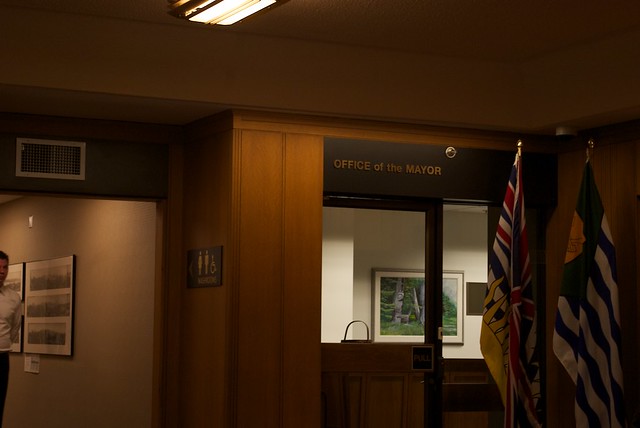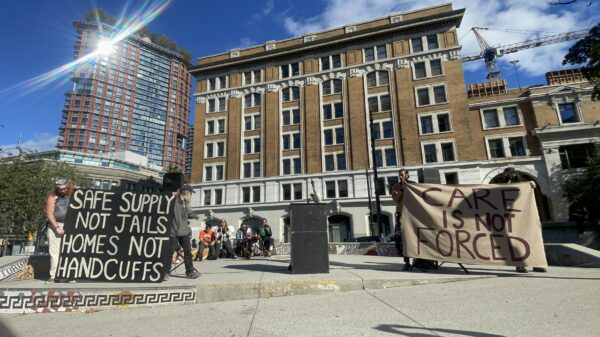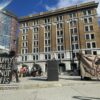For the last few years the City has repeatedly claimed that there is no money for housing. As the Mayor said last October when rejecting social housing above the Strathcona Library: "we don’t have the money in the drawers...we have real limitations and uncertainty in the economy and city books in terms of what we can do."
The reality, however, is that Vancouver has the lowest business taxes in the world. This surprising fact is complimented by another little-known fact: City Hall controls a multi-billion dollar fund it could use to develop social and affordable housing, called the Property Endowment Fund.
The Property Endowment Fund (PEF) was originally created in 1975 and was valued at around $100 million. It holds all of the city's long-term land leases - for example, the parking lot on which the Vancouver Art Gallery hopes to construct its new building, at Cambie and Georgia. The Fund was initially created by the centre-left municipal party TEAM (TEAM was the result of a similar left-wing split that spawned Vision out of COPE). TEAM created the Fund in order to hem an NPA policy of selling city owned properties and then shifting the sale over to the operating budget in order to decrease taxes. The PEF was a strategy to stop the dead-weight loss of city land holdings while creating funds to “support the City's public objectives."
Today, the board of the PEF is comprised of the Mayor, two Councillors, the City Manager, and the Director of Finance. Minutes to meetings of the board have, in the past, not been available to the public. However there have been both successful and unsuccessful Freedom of Information Act (FOI) requests for documents of the PEF board. There have been several calls by City Councillors to make this fund more transparent. COPE Councillors Tim Louis and Ellen Woodsworth have both spoken out about the fund's lack of accessibility. However, secrecy remains the status quo. This has led to wide speculations and criticisms of its value and current use.
In the mid 2000's it was proposed by some that the PEF should be used in ways outlined in its mandate: to support the City's public objectives. For a long time the city has desperately needed more social housing and the current Council has done next to nothing to stop homelessness. In the mid 2000's, NPA mayor Sam Sullivan quashed proposals to use the PEF for progressive initiatives, instead arguing to "restore sustainability" to the Fund. What he meant was to maintain a profitable fund that adds a few millions dollars to the City’s operating budget to keep down our low business taxes.
Fast-forward to 2010 and the Property Endowment Fund is estimated to be worth almost $3 billion. The fund is rarely itself discussed, but has a tendency to loom over municipal politics. It was discussed briefly in 2010, when conservative blogger Daniel Fontaine of City-Caucus filed a Freedom of Information Act request for PEF board meeting minutes, of which there were none in 2009. The revelations of the FOI were significant: the PEF board had not met that year.
Right now, the Fund is managed in secret by the Real-Estate division of the City government. The holding of such a large fund is not only an internal conflict of interest, since councillors can directly affect land prices by the powers of rezoning, but also a public conflict of interest, because while the people of Vancouver have prioritized housing affordability as a number-one issue, the fund makes the city into a real-estate speculator, helping to further push up the property values that make our city so unaffordable.
On the flip-side, the PEF can be used to purchase land or to fund social housing on land contained within the fund, and this does not have to decrease the value of the PEF. The PEF consists of long term land holdings. It can still accomplish its mandate by acquiring properties that can be used by Vancouver residents in the form of affordable housing. And not only do people with low-incomes have a right to stay in Vancouver, supportive and social housing will save the city money in the long run. Several recent studies comparing the costs to provincial and municipal governments of housing versus not housing people show that housing people is much less expensive than not housing.
One of the four objectives of the PEF is “to support the City's public objectives.” Right now, the number one priority for residents is homelessness and housing affordability, according to budget consultations that took place over the past few months. The PEF’s purpose is not to support the construction of financially unfeasible luxury housing on city-owned land, nor to boost Vancouver’s credit rating. Its purpose is to make it possible for the city to satisfy the needs of the people. The current council has been implicated in appeasing the wishes of real estate developers before providing for its own citizens - the government needs to be held accountable.
Since their election, Vision Vancouver have been arguing ad nauseam that "unfortunately" they can’t put together enough money for housing. As described in a previous Mainlander article, the Mayor's strategy to end homelessness has been merely to claim responsibility for the completion of social housing initiatives from the time of Mayor Sam Sullivan. There have been no new initiatives. Meanwhile, Vancouver has become the most unaffordable city in the world, as has constantly been demonstrated in international research tallies.
The City has been focusing as much attention as possible on its fourteen sites of social housing. However, as we have pointed out, the idea that these delayed sites are deserving of praise is a myth. Since finalizing the 14 sites, the City has said that their job well done means they are done the job, since they longer have money. In a nutshell, the argument that keeps coming out of City Hall is: we did our best but we can't build housing anymore. But as seniors are becoming homeless and working people are being turned away from shelters, the PEF continues to grow. When will the Property Endowment Fund be used to solve the housing crisis?
















